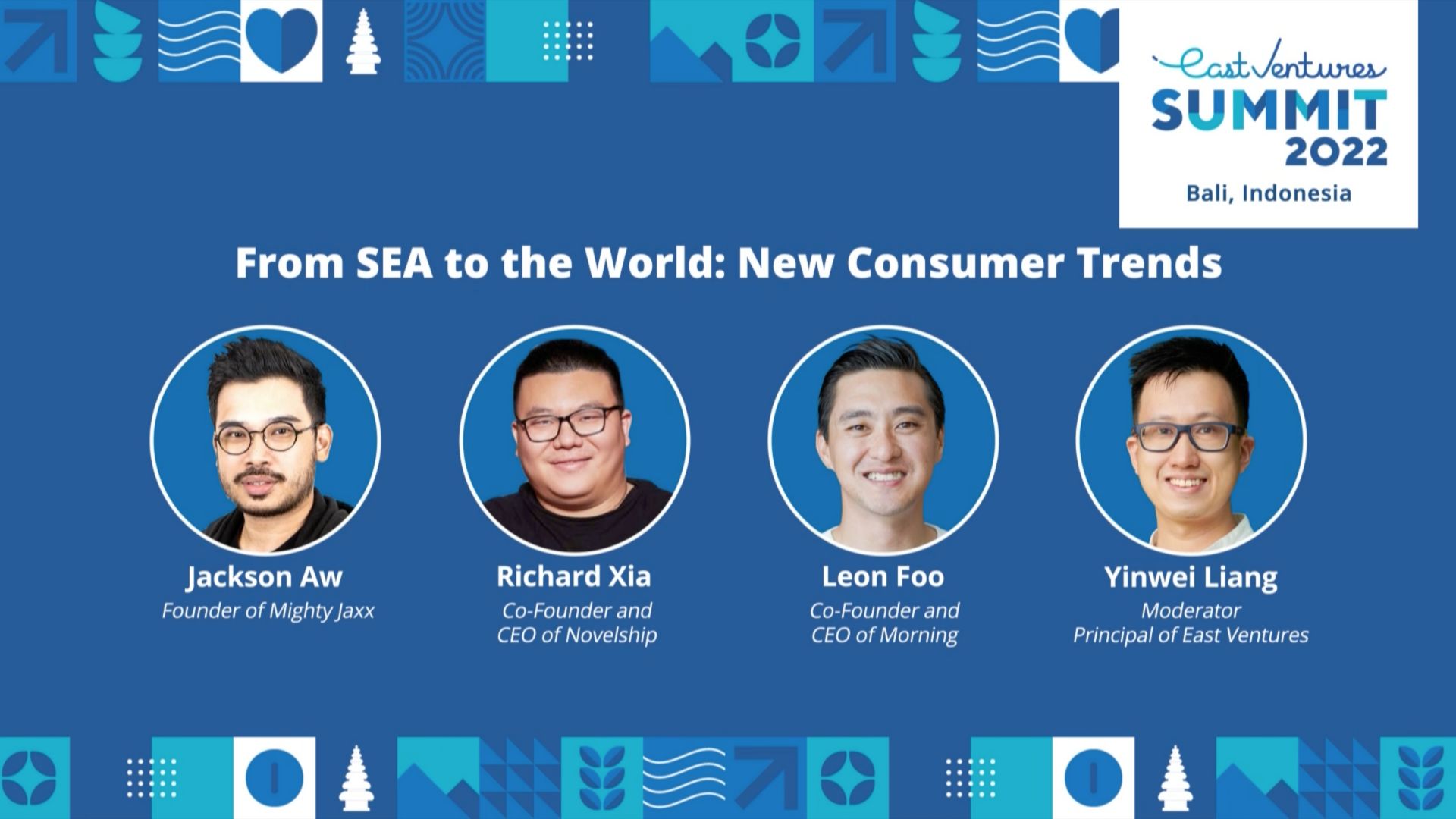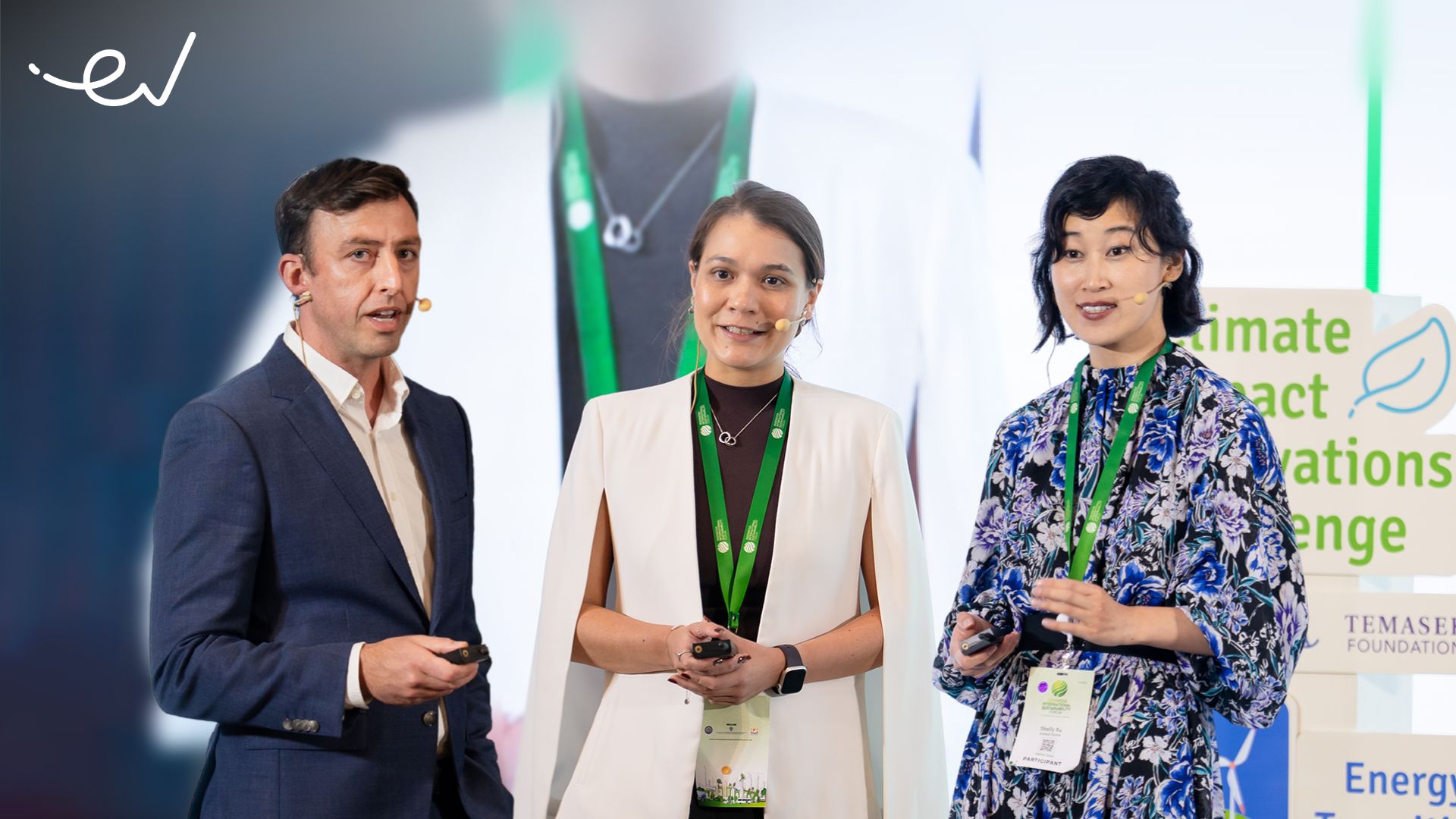The perspectives from D2C founders on facing the macroeconomic backdrop, supply chain, and outlooks in the next 12 months
“From Southeast Asia to the World: New Consumer Trend” is one of the topics for the panel discussions at the East Ventures Summit 2022, where the LPs, partners, founders, and team members of the East Ventures Ecosystem participated in a series of insightful sessions.
This session presented three founders of Direct-to-Consumers (D2C) Singapore-based startups: Richard Xia – CEO of Novelship, Southeast Asia’s largest sneaker marketplace that has business across six markets, including Singapore, Malaysia, Indonesia, Australia, New Zealand, and Taiwan. Leon Foo – Co-Founder and CEO of Morning, which developed the IoT coffee capsule machine and coffee products. It has expanded to 25 countries. Jackson Aw, CEO and Founder of Mighty Jaxx, an integrated pop culture platform that creates and sells digital and physical collectibles to 80 countries. East Ventures’ Principal, Yinwei Liang, moderated the session.
Founders shared their perspectives regarding the new consumer trend while facing the macroeconomic backdrop, the challenges in the supply chain, key global trends, and some gems of wisdom to take advantage of recent consumer trends and outlooks in the next 12 months.
Despite rising inflation worldwide, falling asset markets, and concerns over reduced purchasing power, the founders still see an increase in sales, as people still pursue their hobbies during the tough times.
However, supply chain issues have been something the founders need to pay more attention to since Q4 of last year, which the Russia-Ukraine war has exacerbated. The founders revealed that last year’s Q4 was challenging, as they needed to secure the supply chains and logistics. For instance, Morning’s Leon said that the company has constantly spoken to suppliers, pre-purchased some coffee stocks, and performed average dollar costs, so the company can ensure the supply and distribution of coffee remains secure. He believes stockpiles are king for retail players, especially in Q4 last year.
Having a similar experience, Jackson of Mighty Jaxx said the company began looking into some countries to manufacture the products they needed, as most products today are made in China. Indonesia has become one of the destinations of other Southeast Asian countries as a source of manufacturing and a fulfillment center. However, according to him, it takes six to nine months to incubate skill sets so that it can produce sophisticated quality products.
Concerning the key trends, Richard observed that Southeast Asian founders can now afford to expand their limits and vision from a regional to a global perspective. The world and industries are becoming increasingly globalized, which makes less of a constraint for Southeast Asia-born solutions, as long as they have a precise product-market fit and competitive advantage that answers an unfulfilled demand.
Leon raised three key trends that founders can take advantage of sustainability, authenticity, and exclusivity. He also noted that it is essential to talk to people when making business decisions in the face of headwinds or expansion. Brands should survey the market and collect lagging and leading indicators from people on the ground to avoid mistakes and get early warnings of a crash that they can prepare for beforehand.
As for Jackson, he highlighted the digital and physical bridge as a rising global trend. The ability to consolidate physical and digital assets to derive value for the customer will be expected to drive the conversion rate in the next 12 to 18 months.
To other founders, Richard says that they have to be very adaptable and calm in dealing with short-term conditions. Yet, they also need to have a long-term vision and opportunity. Moreover, Leon advises that founders must think and grow globally but act locally. Do not ignore the signs of global economic crisis, and have to engage with the community, which can be a perfect tool for the founders to go through tough times.
Below is the transcript of the panel discussion. It has been edited for brevity and clarity.
How is the macroeconomic backdrop affecting consumer trends? Inflation is on the rise, asset markets are down, and people have less money to spend. How is this affecting your outlook on discretionary consumer spending and consumer sentiment? How do you see this impacting your businesses?
Jackson: Because we’re still in the earlier years of the company, we’re still in the growth stage. What we could draw a comparison from is the pandemic. And what happens in a pandemic for an item like collectibles? The truth is, it gives joy and happiness to people in times of darkness and times of light. No matter how small, it fulfills a part of your life.
Through the pandemic, we grew 2 to 3X in revenue and largely driven by a wide range of product categories, from US$ 10/item to US$ 1,000/item. We cater to fans of different ranges. Moving into the next 18 months, we will continue to build on that product line of things, so that it caters to the right demographic, but also to understand what are they truly looking for. If we understand, we can harness that. In a more macro situation, it would serve its purpose, despite the downturn that we are looking at.
Richard: To be honest, we haven’t seen any major impact to our sales and performance on the marketplace. In fact, from COVID when the lockdown happened, to early this year, we saw almost 80 to 90x growth of monthly sales, and subsequently it has remained pretty consistent, so we have not seen any major impact.
Yes, there is some impact in discretionary spending, but the market opportunity is large. The market opportunity across the APAC region is about a US$ 30 to 40 billion market in terms of sneakers, apparel, collectibles. It’s a very large hobby market, especially in times of stress and darkness. This is something that they can turn towards to get relief, especially if you’re working remotely under a very stressful situation. Second, we’re still in the early stages of growth, we are still seeing 15 to 20% CAGR in terms of the overall industry. Those were a minor impact which is still not enough to dent the overall market condition. In terms of supply chain, with the recent Russia-Ukraine war, we see quite a big increase in the supply chain costs. That is something more of a challenge to us compared to any macro conditions in terms of consumer spending.
What are your thoughts on the impact of the current macroeconomic backdrop and supply chain issues?
Leon: Before I go on to the supply chain, some of you may know coffee is recession-proof. Whether there’s a recession or very bad inflation, people still drink coffee at home or outside. We are on the flip side. As high inflation and recession comes, we see more people consuming coffee at home and less at the cafe. During tough times, people want to experience practical luxury, like elevating your essentials. We benefited from that by having better coffee more accessible because coffee is an item that is considered an affordable luxury. I think across different markets, people want to feel good and are spending a bit more despite the world being vague and gloomy. This is a current trend that we also see.
For the supply chain, you heard that everybody suffered from the shortage of chips last year. We were not spared during those times. We constantly spoke to suppliers. We were pre-buying some of these chips, and the dollar cost averaged up. We made sure that we had supply and logistics. It was a kind of nightmare in Q4 last year. I think everybody was trying to ship goods around the world, especially in Q4, due to Black Friday. We still want to really change in Q4, because instead of having cash is king, having stock is king in Q4 for at least retail.
Jackson: Most of our products, 90% of them are basically made in China. So Q4 (2021) was a challenging time for us, moving into Q1 and Q2 as well because we do have quite a lot of products in the pipeline.
When we look at the environment in which the products are in, how defensible can we make it? How can we decrease the consolidation part of it? We begin to look at different countries or the ability to manufacture the products that we require. One of them is Indonesia, among other Southeast Asian countries. If we can get the source of origin from different areas and have our fulfillment centers delivered in the domestic market, it will cut down a lot of time in tandem with the cost to be managed. However, the sophistication of the quality and the product have to be educated as not every region will be able to perform and create products at that level. It is necessary to have about six to nine months of incubation of the skill sets that are required in this region and give back to the community to let them level up to a level that is of global quality. Something that we have focused on for the last three or four months.
All of you ship products to different countries in the world, so you have a very global outlook. Are there any key trends that you see globally? Are there any low-hanging fruits that you think some founders get exploited from? Any tips and tricks that people should look out for?
Richard: Like a lot of Southeast Asian founders, we were not very confident of our potential. When we define our business and introduce ourselves, we usually say, “We are Southeast Asia (SEA)-based or focused on Southeast Asia. But, increasingly with a globalized world, you can ship globally as well. This is no longer a constraint.”
Southeast Asia-born solutions, companies, businesses and brands can also go global, as long as there is a competitive advantage, the unfulfilled demand, and meet them competitively. We can define ourselves as a SEA and global-based business. Actually, half of our business really comes outside of SEA. I think this is also one big trend that I see a lot of founders really taking advantage of. Going forward, this is definitely one big opportunity that we can look forward to, that Southeast Asia-based designs, solutions, founders, can also offer solutions to the world.
Leon: Some of the key trends that we see. Number one – sustainability. Being sustainable as a brand. Second, being authentic. People are looking at things a bit differently. Last time, luxury brands would be positioning, but now being authentic is actually quite important.
Third, talking to customers and people on the ground, surveying the market, getting a bunch of indicators lagging and both leading. You really don’t want to be on the wrong side. For example, currency risks, transfer pricing, duties and taxes as we expand overseas. Talking to other people has made us less mistakes. The last one, even the headwinds, we should adjust. For example, we adjust our product mix to have cheaper coffee but still with very good quality. We adjust our supply chain to weather and our sales cycle to bolster the cash.
Jackson: I think one of the key trends and increasingly with a lot of fans would be the digital and physical bridge. Moreover, the ability to consolidate the assets of both digital and physical and off what the value it will derive to the customer. I think it is something that will increasingly be quite clear in the next 12 to 18 months. We did attach ourselves from digital natives to physical collections, we do see a 60% conversion rate from there.
I also think that a lot of these current digital companies need to bridge into real-world experiences. They work with agencies and brand partners to create real-life assets. Our background actually provides the ability to work and expand on what they have been focusing on.
Can you share some gems of wisdom to take advantage of new consumer trends or to share an outlook for the next 12 months ahead?
Richard: I believe most of the 99% of founders, and entrepreneurs, have a long-term vision. Whether it’s investors, LPs, we are in the long haul. Beyond the short term shock, I still have very strong confidence in the future of Southeast Asia and across the whole of Asia. Dealing with the short term market condition, we definitely must be very adaptable, to make any changes necessary to survive. Once we are able to deal, there’s also a need to be not just reactive to short term shocks. [Founders] also need [to be adaptable] in the long term, ‘what’s the long term opportunity?’ In the end, I believe that founders will definitely get back on track in terms of economic growth.
Leon: Grow global, think global, but act local. I think some of these things apply to similar market knowledge. Don’t ignore the signs of the global economic crisis and take into account these things, as you expand overseas and every single market is a bit different. Some markets are insulated a bit more. The last thing is the community. It can be a very good tool to power you through these tough times with sales and backups and limited drops. I think those are very powerful things.
The panel discussion can be rewatched on demand on our official YouTube channel.







